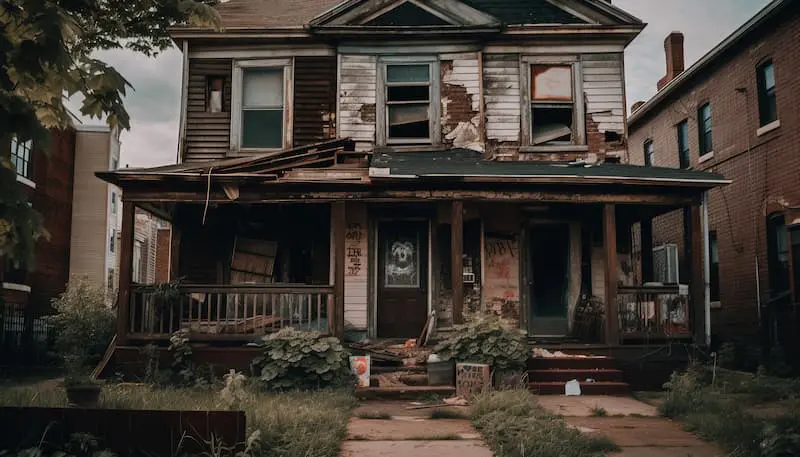Abandoned houses in Washington, D.C. are more than an eyesore; they’re a problem that can affect your neighborhood home values, safety, and overall livability. Whether you’re a concerned neighbor, a relative who inherited a property, or the legal owner unsure of what to do, it’s essential to understand the possibilities for an abandoned house.
Abandoned D.C. homes present legal complications, financial responsibilities, and potential opportunities. Accurate information and a solid action plan can help you turn a burdensome situation into a productive solution.
What Is Considered “Abandoned” in Washington, D.C.?
In Washington, D.C., a property is generally considered abandoned if it’s been vacant for an extended period, shows signs of disrepair, and appears uninhabitable. The Department of Buildings (DOB [formerly known as DCRA]) assesses and flags developments that meet certain conditions.
You might be dealing with an abandoned house if it has:
- Boarded or broken windows and doors
- Overgrown grass, trash accumulation, or pest infestations
- No visible signs of occupancy for months
- Notices posted by the city about violations or tax delinquencies
A home may be subject to higher property tax rates and additional city enforcement actions once the city designates it as “vacant” or “blighted.”
Why Abandoned Homes Are a Big Problem in D.C.
Washington, D.C., is known for its historic row homes and tightly packed neighborhoods. An abandoned house can easily become a magnet for crime, vandalism, or squatters. Over time, this can drag down the value of nearby homes, frustrate neighbors, and create public safety concerns.
As a homeowner or neighbor, you’re likely wondering who is responsible, and what you can do to avoid the headache of living next to an abandoned property.
If You Inherited an Abandoned Property
If you received the home through probate or inheritance, you’re likely the legal owner or one of several heirs. That designation comes with rights and obligations.
Start by clarifying ownership. You may need to:
- Check the deed through the D.C. Recorder of Deeds.
- Settle any outstanding property taxes.
- Handle title transfer issues if the previous owner died without a will.
- Be prepared for fines, back taxes, or repair mandates issued by the city.
You don’t need to rehab the property yourself. You can avoid renovation costs, code compliance issues, and ongoing maintenance by selling your house as-is.
If You’re a Neighbor Dealing With an Abandoned Home
As a frustrated neighbor, you have more power than you think, even if you’re not the owner. D.C. has programs that allow concerned residents to report vacant or blighted properties to the city for investigation.
You can:
- File a 311 report with the Department of Buildings to trigger an inspection.
- Track the status of the property on the Vacant and Blighted Building List.
- Attend ANC or neighborhood meetings to raise concerns.
You can’t force the owner to sell. However, public pressure and city enforcement can motivate an owner to act, especially when property taxes start skyrocketing under the city’s vacant property classification.
When Selling the Property Makes Sense
If you’re the owner or heir to an abandoned property, holding onto it long-term may not be worth the financial and emotional strain.
Selling as-is can be a smart move if:
- You don’t have the funds for major repairs or renovations.
- You want to avoid racking up fines or back taxes.
- You’re an out-of-town owner with no plans to return.
- The home attracts illegal activity or costs the neighborhood peace of mind.
Cash buyers in Washington, D.C., specialize in purchasing vacant and abandoned homes quickly. These buyers can help you avoid inspections, appraisals, and costly clean-up. They often take the property in its current condition and handle all necessary repairs after closing.
Selling to a cash buyer allows you to move forward without sinking money into a property you no longer want or can’t afford to maintain.
Legal and Bureaucratic Hurdles to Watch For
Ensure you’ve covered the legal bases before selling or acting on an abandoned home.
Be aware of title issues. You may need probate or legal assistance if there were issues with the property transfer process.
Tax liens can also become an issue. Unpaid taxes can delay the sale or cut into your profits.
Lastly, take into consideration the D.C. vacant property registration. The city requires vacant properties to be registered annually. Failing to do so could mean steep penalties.
A reputable homebuyer or real estate attorney can help you untangle these complications and close the deal without surprises.
Turning a Liability Into an Opportunity
An abandoned home doesn’t have to stay a burden. You can take control, whether helping your neighborhood by initiating a city inspection or offloading a property that’s become too much to manage.
At Express Homebuyers, we buy houses in Washington, D.C., allowing you to sell quickly for cash. An as-is cash sale is often the fastest way to remove the red tape, avoid further costs, and bring a neglected property back to life in the hands of someone ready to restore it.


